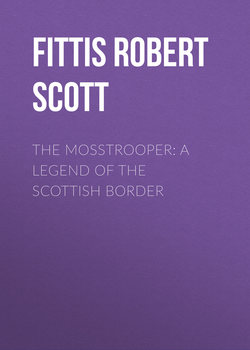The Mosstrooper: A Legend of the Scottish Border

Реклама. ООО «ЛитРес», ИНН: 7719571260.
Оглавление
Fittis Robert Scott. The Mosstrooper: A Legend of the Scottish Border
PREFATORY NOTE
ROBERT SCOTT FITTIS
Chapter I
Chapter II
Chapter III
Chapter IV
Chapter V
Chapter VI
Chapter VII
Chapter VIII
Chapter IX
Chapter X
Chapter XI
Chapter XII
Chapter XIII
Chapter XIV
Chapter XV
Chapter XVI
Отрывок из книги
ROBERT SCOTT FITTIS represents a type of the Scottish man of letters which is rapidly disappearing. While it could not justly be said that he was unique as a personality, or that he introduced a novel combination of intellectual qualities and thereby formed an epoch, the honour must be ascribed to him of having continued the best traditions of the Augustan Age of Scottish Literature, and of maintaining the dignity in literary affairs to which his native land had attained. He was a Scotsman “through and through,” loving the land of his birth with intense devotion, reverencing the heroes whom she had brought forth to adorn the records alike of war and literature, and devoting the energies of a long life to setting before his countrymen the best models of patriotism for their imitation. His natural gifts were so strenuously cultivated that in his later days he was regarded as an inexhaustible encyclopædia of recondite information of the most varied kind. He was from his youth an omnivorous reader, and he possessed that best of all gifts “a reference memory,” as Dean Stanley called it, and could bring forth from his treasures, new and old, a surprising variety of apt quotations and original inferences. In some respects his mind was akin to that of the late John Hill Burton, the historian. He had the same finical love of accuracy, the same fervid Scottish spirit, and a similarly broad outlook upon general literature which prevented him from becoming merely a local historian and nothing more. While his labours in connection with Perthshire history were unceasing, and have produced a rich storehouse of facts, he dealt with national history and literature in a manner which showed the breadth of his mind and the variegated nature of his studies. He was a historian, earnest to separate veritable truth from tradition; yet he was one eager to collect these very traditions as fragments of national character. A student of charters and a genealogist, over whom any time-stained charter or antique paper scrawled with crabbed penmanship exercised a fascination, he was still an ardent lover of poetry, especially such as described the flowery banks of Tay or Tummel, the gowany lea of Gowrie, or the Bens and Straths of Garth and Glen Lyon. Upon one of his title-pages he placed two quotations which aptly express his characteristics: —
To describe adequately the life of such a man within limited space is impossible. All that can here be done is to outline his industrious career, as a tribute to one whose devotion to national literature, even in times of severe distress and difficulty, must ever command sincere respect.
.....
“Hand and glove.”
Prompt was the result of this response – almost like the effect of the “Open, Sesame” of the Forty Thieves. The warder, confident that the knowledge of the password was confined to friends (and it was changed at intervals), descended from his coign of vantage; and after some preliminary clank of chains, an aperture, measuring scarcely a foot square, opened in the side of the portal, without the iron-sheeted gate, and about breast-high from the ground, whilst the dog was heard sniffing and growling along the bottom of the gate.
.....